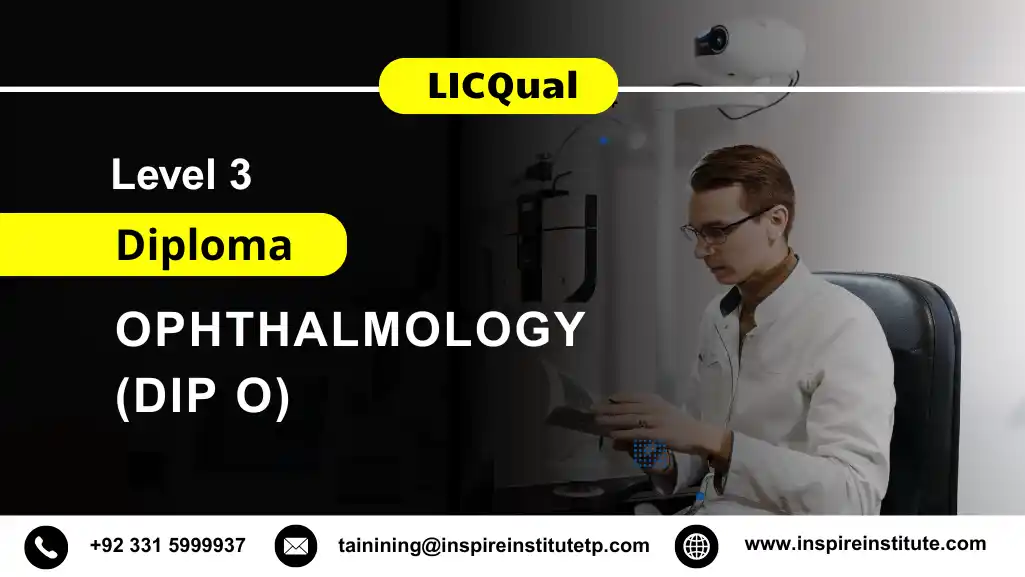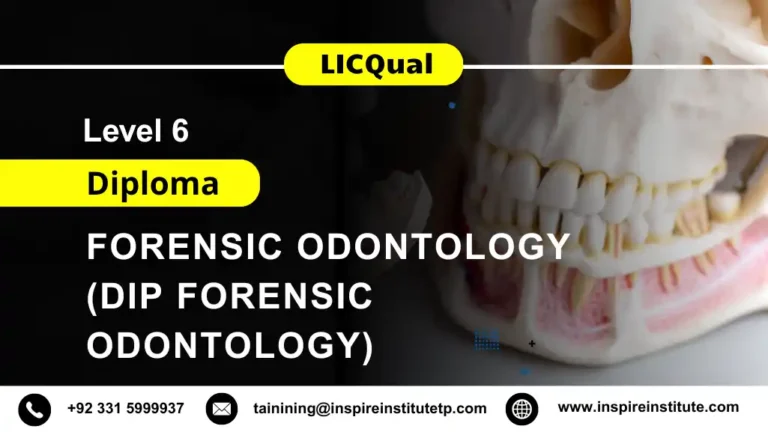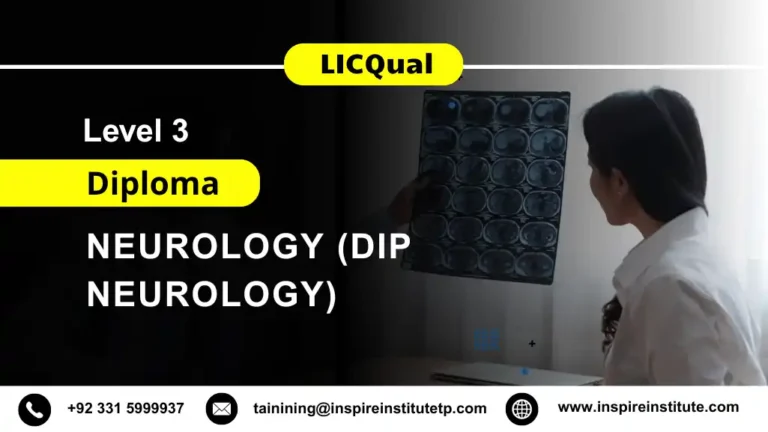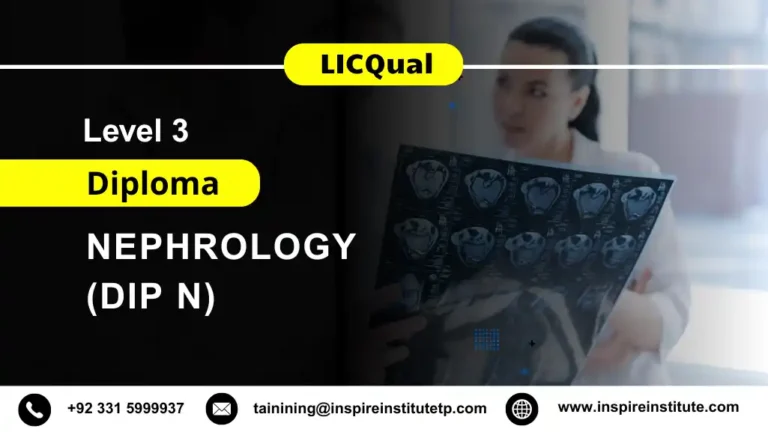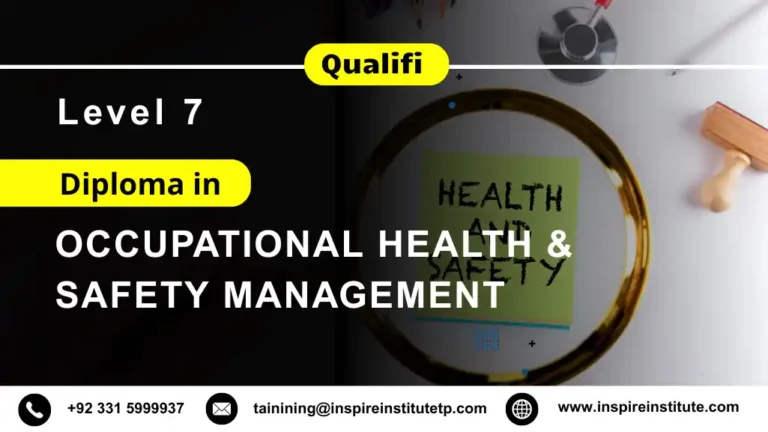LICQual Level 3 Diploma in Ophthalmology (Dip O)
The LICQual Level 3 Diploma in Ophthalmology (Dip O) is a flagship professional qualification designed for healthcare practitioners who aspire to specialize in eye care. In an era where ophthalmology training, diploma in ophthalmology, and eye care certification are ever more in demand, this course stands at the forefront of advanced, recognized education in visual health and ocular disease management. The relevance of ophthalmic expertise is undeniable, given the growing global burden of eye disorders and the critical need for skilled clinicians in both urban and rural settings.
This diploma course offers a comprehensive scope: from foundational principles of ocular anatomy and physiology to advanced diagnostics, treatment modalities, and hands-on procedural skills. Learners will explore lens optics, retinal imaging, glaucoma management, cataract surgery basics, and more—all mapped to current clinical practice. The curriculum is structured to bridge theory with real-world application, making ophthalmology training accessible and deeply relevant to practicing professionals.
By the end of the course, graduates will possess the specialized knowledge to interpret optical coherence tomography (OCT) scans, diagnose refractive errors accurately, and manage common ocular pathologies. They will also acquire procedural competencies—such as slit lamp biomicroscopy, tonometry, and fundoscopy—enabling them to function confidently in clinical and hospital settings. These eye care certification skills are highly transferable and in demand across hospitals, clinics, and community eye programs.
Beyond technical ability, this qualification nurtures critical thinking and evidence-based practice. Participants will learn to evaluate research, understand ophthalmic therapeutics, and stay updated on evolving standards. The emphasis on real case discussions, peer collaboration, and clinical placements ensures that this diploma in ophthalmology is not merely academic but rigorously practice-oriented.
This formal, academically grounded course invites ambitious clinicians—optometrists, nurses, medical officers, and allied eye care professionals—to elevate their careers. With accreditation from LICQual and alignment to international best practices, the LICQual Level 3 Diploma in Ophthalmology (Dip O) is both credible and career-boosting.
Why Choose this Qualification
The LICQual Level 3 Diploma in Ophthalmology (Dip O) is a specialized qualification designed to equip learners with the essential knowledge and clinical skills required for a professional career in eye care and vision health. Ophthalmology is a vital branch of medicine that focuses on the diagnosis, treatment, and management of eye diseases and visual disorders, including conditions affecting the retina, cornea, optic nerve, and related structures. Choosing this internationally recognized diploma strengthens your academic foundation while preparing you to play a crucial role in enhancing patient vision and overall ocular health.
Key Reasons to Choose this Qualification
Comprehensive Understanding of Ophthalmology
- Gain a strong foundation in ocular anatomy, physiology, and visual system function.
- Learn about the diagnosis and management of common eye conditions such as cataracts, glaucoma, diabetic retinopathy, and refractive errors.
- Study the latest diagnostic technologies, including slit lamp biomicroscopy, tonometry, and retinal imaging.
- Understand preventive ophthalmology, eye hygiene, and strategies to reduce vision impairment.
Practical Skills for Real-World Eye Care
- Acquire hands-on knowledge to assess and monitor patients with visual and ocular disorders.
- Learn essential techniques for vision testing, eye examination, and clinical documentation.
- Apply evidence-based practices in the management and treatment of both acute and chronic eye diseases.
- Develop analytical and diagnostic decision-making skills through real-life case studies and simulations.
Career-Ready Qualification
- Enhance employability with internationally recognized skills in ophthalmology and visual health.
- Prepare for diverse roles in hospitals, optometry clinics, community eye centers, and research institutions.
- Build a strong academic base for progressing into advanced medical or optometry studies.
- Demonstrate clinical competence through an accredited and globally respected qualification.
Strong Focus on Patient-Centered Eye Care
- Develop effective communication and interpersonal skills for interacting with patients experiencing vision loss or eye disorders.
- Learn to provide empathetic, ethical, and culturally sensitive ophthalmic care.
- Understand techniques for patient education on eye health, vision protection, and preventive care.
- Gain confidence in supporting patients through diagnosis, treatment, and follow-up management.
Internationally Recognized Qualification
- Earn a diploma awarded by LICQual, a globally recognized awarding body known for academic excellence.
- Open doors to international career opportunities in ophthalmology and visual healthcare.
- Gain recognition and credibility among healthcare employers and professional networks.
- Use this qualification as a stepping stone for advanced certifications in ophthalmic sciences or vision technology.
Flexible and Structured Learning
- Benefit from a well-organized curriculum tailored for step-by-step academic and professional growth.
- Learn at your own pace through an assignment-based assessment system that enhances understanding and skill application.
- Access comprehensive study materials, resources, and case-based content focused on eye health and ophthalmology practice.
- Balance your studies with personal or professional commitments while maintaining high academic performance.
Ethical and Professional Development
- Gain knowledge of professional standards and ethical conduct in ophthalmology and clinical practice.
- Understand patient rights, confidentiality, and responsible healthcare delivery.
- Develop leadership qualities and confidence in handling complex ophthalmic situations.
- Learn to make informed and ethical decisions while maintaining high professional integrity.
Contribution to Vision Health and Society
- Play an active role in promoting global vision health and preventing avoidable blindness.
- Support initiatives for eye screening, visual rehabilitation, and community health awareness.
- Build a career that combines professional advancement with social contribution.
- Help improve quality of life for patients through skilled eye care and preventive ophthalmology.
The LICQual Level 3 Diploma in Ophthalmology (Dip O) is more than an academic credential—it is a professional pathway that blends medical science, clinical expertise, and patient-centered care. With its balance of theoretical depth, practical skills, ethical training, and international recognition, this diploma empowers learners to excel in the field of ophthalmology. By choosing this qualification, you are investing in your future as a healthcare professional dedicated to improving vision and transforming lives worldwide..
Course Overview
LICQual UK Awarding Body
Average Completion Time:
4-12 Months
Study Units: 6 Units
Evidence & Assignment Based
Mandatory Units
Who Should Take This Course
The LICQual Level 3 Diploma in Gastroenterology (Dip G) is a specialized qualification designed for individuals passionate about digestive health who aspire to build a strong academic and professional foundation in gastroenterology. This vital field of study focuses on the diagnosis, treatment, and management of digestive system disorders, including diseases affecting the stomach, intestines, liver, pancreas, and related organs. By choosing this internationally recognized diploma, learners prepare for a rewarding career dedicated to improving digestive health and enhancing patient care across diverse healthcare settings.
Key Reasons to Choose this Qualification
Comprehensive Understanding of Gastroenterology
- Gain an in-depth understanding of gastrointestinal anatomy, physiology, and the functional mechanisms of the digestive system.
- Learn to diagnose and manage common gastrointestinal disorders, liver diseases, and pancreatic conditions.
- Study preventive healthcare strategies, including nutrition, diet management, and lifestyle modifications to promote digestive health.
- Understand the principles and applications of endoscopic procedures, diagnostic imaging, and disease monitoring in gastroenterology.
Practical Skills for Real-World Healthcare
- Acquire practical knowledge to assess, monitor, and support patients with gastrointestinal conditions effectively.
- Learn key clinical techniques used in managing digestive emergencies and providing critical healthcare support.
- Apply evidence-based medical practices in diagnosing and treating acute and chronic digestive illnesses.
- Strengthen analytical and problem-solving abilities through clinical case studies, patient simulations, and applied learning.
Career-Ready Qualification
- Enhance employability with specialized skills recognized in gastroenterology and digestive healthcare.
- Prepare for professional roles in hospitals, gastroenterology clinics, research institutions, and community health organizations.
- Build a strong academic base for advancing into higher-level medical, nursing, or digestive science qualifications.
- Demonstrate clinical competence and professional credibility through an internationally accredited diploma.
Strong Focus on Patient-Centered Care
- Develop effective communication and interpersonal skills for engaging with patients suffering from digestive disorders.
- Learn to provide compassionate, ethical, and culturally sensitive care tailored to patient needs.
- Understand the importance of patient education in promoting healthy digestion and lifestyle changes.
- Gain confidence in guiding patients through treatment plans, preventive strategies, and long-term health management.
Internationally Recognized Qualification
- Earn a qualification awarded by LICQual, an organization known globally for its high academic and professional standards.
- Access opportunities for global careers in gastroenterology, digestive medicine, and allied healthcare sectors.
- Build credibility and recognition among employers, peers, and healthcare professionals worldwide.
- Use this diploma as a stepping stone toward advanced certifications and postgraduate studies in medical science.
Flexible and Structured Learning
- Benefit from a well-designed curriculum structured for progressive academic and professional development.
- Study at your own pace through assignment-based assessments that measure theoretical and practical competence.
- Access comprehensive learning materials and digital resources focused on gastroenterology and digestive healthcare.
- Achieve academic excellence while balancing study with personal and professional responsibilities.
Ethical and Professional Development
- Gain insights into ethical practices, patient confidentiality, and professional conduct in gastroenterology.
- Learn to apply ethical reasoning and make responsible decisions in complex clinical situations.
- Understand patient rights and the importance of maintaining professionalism in healthcare environments.
- Develop leadership qualities and confidence essential for future growth in medical and healthcare professions.
Contribution to Society and Digestive Health
- Play a vital role in improving digestive health outcomes and reducing gastrointestinal disease prevalence.
- Support public health initiatives promoting nutrition, disease prevention, and community awareness.
- Build a career that combines professional achievement with meaningful contributions to public health.
- Help improve quality of life through skilled clinical practice, patient education, and compassionate care.
The LICQual Level 3 Diploma in Gastroenterology (Dip G) is more than an academic qualification—it is a gateway to a fulfilling career in healthcare. Combining theoretical depth, practical expertise, ethical training, and international recognition, this diploma empowers learners to excel in gastroenterology. By choosing this course, you are investing in a future where you contribute to advancing digestive health and improving patient well-being worldwide.stroenterology. By choosing this qualification, you are investing in your professional growth while contributing to the health and well-being of patients worldwide.
Course Benefits
The LICQual Level 3 Diploma in Ophthalmology (Dip O) provides significant benefits for individuals seeking to build expertise in eye health, ophthalmic practices, and clinical management of visual disorders. By combining essential theoretical knowledge with practical applications, this diploma equips learners to deliver high-quality ophthalmology care, manage common eye conditions, and support preventive eye healthcare strategies. Designed as a flexible, assignment-based programme, it ensures professional development while maintaining academic excellence and relevance in today’s healthcare sector.
Key Benefits of the Course:
- Specialist Knowledge:
Gain a solid foundation in ocular anatomy, physiology, and visual system function. Learners explore the diagnosis and management of common eye conditions, such as cataracts, glaucoma, diabetic retinopathy, and refractive errors. The course also covers preventive eye healthcare practices, vision management, and patient-centered ophthalmology care, preparing learners to make informed and evidence-based decisions in eye and vision healthcare. - Practical Application:
Develop practical skills in assessing patients with visual impairments, interpreting diagnostic results, and supporting early intervention. Learners gain competence in managing ophthalmic emergencies, providing clinical support, and applying best practices in hospitals, clinics, and community settings. The programme ensures graduates can apply theory directly to real-world ophthalmology and visual healthcare. - Recognised Qualification:
Earn a UK-accredited diploma that validates advanced knowledge in ophthalmology and strengthens professional credibility. This recognition ensures alignment with international healthcare and ophthalmology standards, making the qualification valuable for careers in hospitals, eye clinics, research centers, NGOs, and educational institutions worldwide. - Flexible Learning Pathway:
Benefit from an assignment-based study model that allows learners to continue professional or personal responsibilities while advancing academically. This flexible approach makes the LICQual Level 3 Diploma in Ophthalmology (Dip O) ideal for healthcare assistants, optometry students, and career changers seeking a structured yet accessible programme. - Evidence-Based Training:
Explore the latest guidelines in ophthalmic healthcare, vision science, and preventive eye medicine, ensuring that learners can adopt patient-centered, safe, and effective approaches. Training emphasizes early diagnosis, disease monitoring, and evidence-driven healthcare interventions that support both individual patients and wider community eye health outcomes. - Career Development:
Expand career opportunities across hospitals, eye clinics, community health centers, research institutions, and international healthcare organizations. The diploma opens pathways into roles in ophthalmic support, visual healthcare, and allied medical services, as well as further advanced studies in medicine, nursing, or ophthalmology. - Enhanced Ophthalmology Care Delivery:
Contribute to better vision health outcomes through early detection, accurate care, and preventive eye health strategies. Learners acquire the skills to support patients, promote visual wellness, and manage ophthalmic health challenges, ultimately improving community vision health and patient quality of life. - Professional Growth:
Strengthen clinical knowledge, decision-making, and communication skills needed to interact effectively with patients and families. The course also builds professional values such as empathy, ethics, and interdisciplinary collaboration, preparing learners to play a crucial role in ophthalmology healthcare delivery.
The LICQual Level 3 Diploma in Ophthalmology (Dip O) equips learners with vital knowledge, practical competence, and a UK-recognised qualification. It empowers healthcare professionals and aspiring practitioners to improve eye health outcomes, promote vision care awareness, and contribute to global ophthalmic health initiatives.
Eligibility Criteria
The LICQual Level 3 Diploma in Ophthalmology (Dip O) is a UK-accredited programme designed for aspiring healthcare professionals, nurses, optometry assistants, and community health practitioners who wish to develop a strong foundation in eye health, ophthalmology, and clinical management of visual disorders. This assignment-based qualification combines essential theoretical knowledge with practical applications, making it ideal for medical students, healthcare assistants, allied health professionals, and individuals looking to specialize in ophthalmology. By meeting the entry requirements, learners ensure they are fully prepared to succeed in the programme and apply their knowledge effectively in hospitals, eye clinics, research centers, and community healthcare settings.
Educational Background:
Applicants should hold a recognised healthcare or science-related qualification, such as a diploma in healthcare practice, nursing, optometry, clinical science, or an equivalent qualification. Candidates with Level 2 or Level 3 qualifications in healthcare, biology, vision science, or related fields may also be considered. Equivalent international qualifications will be reviewed on a case-by-case basis to ensure they meet the suitability standards for the programme.
Professional Experience:
While previous experience in ophthalmology, visual healthcare, or general healthcare is beneficial, it is not strictly mandatory. A minimum of one year of healthcare, caregiving, or clinical experience is recommended. Applicants with exposure to eye care, hospital assistance, or clinical support in ophthalmology will find the course particularly valuable, though motivated individuals without direct experience are also encouraged to apply.
Age Requirement:
Learners must be at least 18 years of age at the time of enrolment, ensuring they possess the maturity, responsibility, and commitment required for training in ophthalmology. This requirement ensures that candidates can engage effectively with both the academic and practical aspects of the qualification.
Language Proficiency:
Since the programme is delivered in English, learners should demonstrate strong reading, writing, and communication skills. A minimum IELTS score of 6.0 or an equivalent qualification is recommended for non-native English speakers. This ensures learners can complete assignments, engage with course materials, and interact professionally in both academic and healthcare contexts.
Technical Requirements:
Applicants should have access to a computer or laptop with a stable internet connection. Basic IT skills are necessary to manage online learning platforms, conduct research, and submit assignments digitally. Familiarity with using word processing tools and accessing digital study resources will support a smoother learning experience.
Required Documents:
Submission of a valid ID or passport, proof of educational qualifications, and evidence of any healthcare or related professional experience (if applicable) is required for registration. Applicants presenting international qualifications may be asked to provide additional documentation for verification.
The Qualification Process
LICQual Level 3 Diploma in Ophthalmology (Dip O) follows a structured pathway to ensure learners gain comprehensive knowledge, practical skills, and professional competence in community oral healthcare.
Step 1: Self-Assessment
Learners review the entry requirements to confirm eligibility. Candidates with a background in dentistry, oral health, or public health are encouraged to apply.
Step 2: Registration
Complete the registration process by submitting required documents such as proof of qualifications, a valid ID, and payment of enrollment fees.
Step 3: Induction
An induction session is conducted to:
- Verify learner eligibility and documentation.
- Introduce study materials, learning outcomes, and assessment procedures.
Step 4: Learning and Evidence Submission
Learners complete assignments, case studies, and practical exercises demonstrating competence in public health dentistry, community oral health assessment, preventive strategies, and program planning.
Step 5: Feedback and Revision
Assessors review submitted evidence and provide constructive feedback. Learners can revise and resubmit work to meet all required standards.
Step 6: Competence Validation
Final submissions are evaluated to confirm that learners have met all theoretical and practical learning outcomes.
Step 7: Internal Quality Assurance (IQA)
The IQA team reviews the assessment process to ensure accuracy, fairness, and compliance with international standards.
Step 8: External Verification (EQA)
External verifiers validate the authenticity and quality of learner achievements.
Step 9: Certification
Upon successful verification, learners are awardedLICQual Level 3 Diploma in Ophthalmology (Dip O) , demonstrating advanced proficiency in community oral healthcare and preparing them for professional growth in dental public health, preventive dentistry, and healthcare policy.

